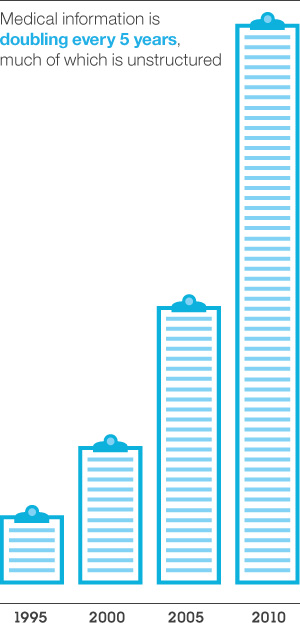 A couple weeks ago, we featured the Institute of Medicine’s (IOM) release of a new landmark study titled Best Care at Lower Cost: The Path to Continuously Learning Health Care in America. One of the recommendations in the report is “to accelerate integration of the best clinical knowledge into care decisions.” IBM’s Watson, the supercomputing system that topped the world’s best human players at Jeopardy! last spring, is one example of leveraging advances in computer science to accelerate knowledge into healthcare decisions.
A couple weeks ago, we featured the Institute of Medicine’s (IOM) release of a new landmark study titled Best Care at Lower Cost: The Path to Continuously Learning Health Care in America. One of the recommendations in the report is “to accelerate integration of the best clinical knowledge into care decisions.” IBM’s Watson, the supercomputing system that topped the world’s best human players at Jeopardy! last spring, is one example of leveraging advances in computer science to accelerate knowledge into healthcare decisions.
As we’ve noted here previously, not only can Watson operate at the speed of 80 teraflops, but it can also over time learn which algorithms to run in which situations. The obvious example of this is Watson’s performance in Jeopardy! — based on thousands of algorithms run on questions received, Watson then presents answers based upon a confidence level.
So how can Watson help Medical Doctors?
According to IBM, it is estimated that 20 percent of diagnoses are either incorrect or incomplete. Furthermore, there are over one million errors in medication prescriptions in the U.S. every year. With the amount of medical information doubling every five years, it is nearly impossible to keep up with this amount of data.
IBM reports:
The MDs are now working with researchers to apply IBM Watson’s capabilities to answer natural language queries — which it first demonstrated by defeating the world’s best human contestants on the quiz show Jeopardy! — to search through tremendous amounts of both structured and unstructured medical data, from journals to CAT scans, to provide practitioners with vital information.
Read the rest of article from IBM here.
(Contributed by Kenneth Hines, CCC Program Associate)










Trackbacks /
Pingbacks